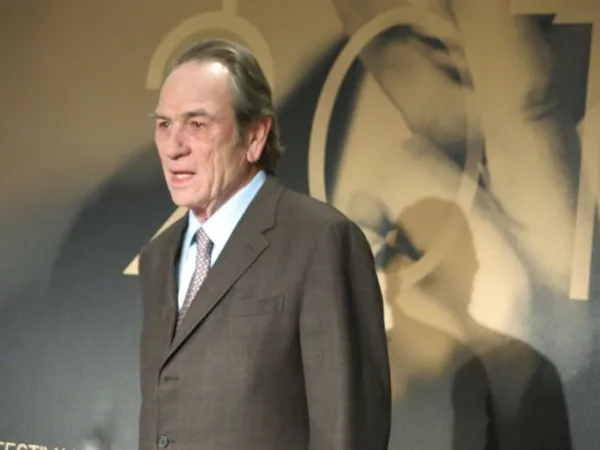 |
| Tommy Lee Jones meets the media in Cannes: "“There have been a lot of bad Westerns made. And that's made it difficult for me ..." Photo: Richard Mowe |
With his craggy features weathered by the outdoor life (he has a farm where he lives in Texas) Tommy Lee Jones would have made a perfect frontiersman of another age.
He appears eternally fascinated by the roots of America, and called in favours from friends to finance his latest foray into the West.
With roles as actor, director, co-writer and producer on The Homesman he relishes multi-tasking. “Having any one of those three jobs makes the fourth one a breeze,” he says casually.
In his relentless quest for authenticity he scoured both photographs and books of the 19th century. “There was one in particular that dealt with the subject of insanity among women at that time and also the treatments for various illnesses. The ‘remedy’ for schizophrenia was to soak the individual in cold water and then to hold her upside down for eight hours. This was not an inviting environment for women in the Victorian era,” he said.
Actress Hilary Swank confirmed that the taciturn Jones was an adept director of actors. “Because of his experience he has a shorthand and only uses a few words to get his understanding across to both his cast and crew,” she said.
 |
| Hilary Swank: "“I am always looking for authenticity. Many of the characters I have played have been intense and strong – and this is another one. " Photo: Richard Mowe |
She was drawn to her character of Mary Bee Cuddy because she was “real” woman. “I am always looking for authenticity. Many of the characters I have played have been intense and strong – and this is another one. She has solid virtues. She cares enormously about the people around her and she wants the best outcome for them.
Jones tried to avoid the obvious pitfalls. “There have been a lot of bad Westerns made. And that's made it difficult for me to make movies about my home and my people. Western became a label, a category, an epithet for any movie that has horses in it.”
He doesn’t see himself ever giving up his craft. “Making movies is fun. There's good company. It's creative. And it combines high adventure and art with intellectual stimulation. I have been an actor all of my life, and I try to get better every day. I do not perceive it as anything other than getting up and going to work every day.
“It's more fun than polo [which he plays]. I don't think it is a fair description to say that I take the money and run. It would be fair to say that I believe that everyone should be well prepared when they come to work, otherwise it would be a waste of time and energy, and thereby lose money. It is a business as well as an art, and if people are not prepared at the beginning of the day then the artistic quality suffers. And the business life of the film is shortened.”
Jones hopes that his work resists categorisation or stigmatisation. "I try to get variety, but when I am told it isn't there I just don't know what to say. You remind me of the lawyer who asks the guy on the witness stand 'Is it true that you allege that you no longer beat your wife?' I would love to have a job in a light comedy. Yeah, of course I would, and I would like to have the confidence to do it. Moreover I would like to find somebody with the confidence to hire me to do it. We'll see.”
He is told (by Broadway producers) two or three times a year that he was the right actor for a role, "but I wasn't famous enough. I agree with Laurence Olivier's take on the profession, that you should only become an actor after making sure you are worthless for any other occupation.
“In terms of stage work, though, we have children and we do not live in New York City, so it is hard to think about moving them and taking them out of school for a commitment that may last only a week or stretch to a year. One never knows. It is a disruptive thought and could be an expensive one. If I was going to return to the stage I would opt for a small theatre in places like Austin (Texas) or Cambridge (Massachusetts) where the audiences are more appreciative and less hysterical than on Broadway.”
Jones is mainly unimpressed by prizes such as the Oscar he won for The Fugitive. make a difference? “I guess it makes you feel good, and shows the world approves of you. We actors seek approval probably more desperately than other people do. It is also very good for business. I have always had a desire, if not a hunger or a desperate need, to make my way through my life using my imagination. I consider it a privilege.”





















